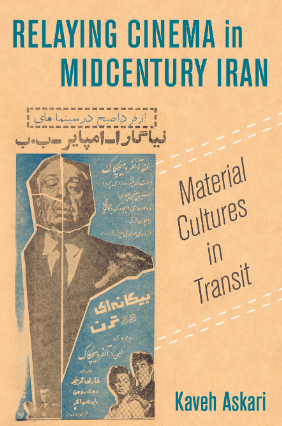موضوعات
آموزش و پرورش
ادبیات و زبان
پزشکی، دندانپزشکی و داروسازی
تاریخ و جغرافیا
داستان و رمان
دیگر
دین و فلسفه
روانشناسی
ریاضیات و آمار
سلامتی، تناسب اندام و رژیم غذایی
شیمی و پلیمر
علوم اجتماعی و حقوق
علوم زیستی و بیوتکنولوژی
فیزیک و نجوم
کامپیوتر و اینترنت
کتابهای کودکان و داستان
کسب و کار و اقتصاد
کشاورزی و دامپزشکی و غذا
معماری
مهندسی و فناوری
هنر و تئاتر
محصولات
Live Sports Media The What, How and Why of Sports Broadcasting Second Edition - Original PDF
نویسندگان: خلاصه: xv Preface Athletic competitions have affected how people perceive life and their roles within social groups since the ancient Olympic Games began in Greece in 776 BC, and most certainly back even farther before recorded history. On the North American continent for more than 1,000 years, the game of lacrosse has affected the social rela- tions among groups of native people, their tribes, and their families. Before a game, people would meet for ceremonial feasts and agree upon the stakes and rules. These meetings helped develop relations between nations, families, and competitors. In some cases, tribes would play a game of lacrosse to settle disputes instead of taking up arms against each other in battle. Sport continues to be a powerful social force, disseminating and reinforcing the values that regulate how people behave, setting examples for how to go about attain- ing goals and determining acceptable solutions for problems. And it presents indi- viduals and groups with a means to escape from the reality of their daily lives, if only for a few hours, into a world of entertainment and celebration populated by talented, charismatic stars capable of remarkable performances, powerful leaders, and teams, all with their legions of adoring followers. The word “sport” itself came into English in the late 14th century as “disport,” meaning a diversion that carried one away from work or serious matters, a recreation or amusement. Its origin is in the Latin verb “portare,” to carry. When you imagine how difficult daily life would have been in the 1300s, any recreation or amusement must have been a relief and a welcome escapeTHIS RADICAL LAND - PDF
نویسندگان: خلاصه: Then the coal company came with the world’s largest shovel, And they tortured the timber, and stripped all the land. Well, they dug for their coal till the land was forsaken, And they wrote it all down as the progress of man. John Prine, “Paradise”1 What happens when the past’s oldest witness comes crashing down dead? A new day will dawn . . . but over what? Where are we, who are we, when the bough breaks? Bostonians opened their eyes on a Wednesday morning in 1876 to opaque February skies bleakly blanketing a city made suddenly strange. At 7 p.m. the evening before, the enormous Great Elm on the famous Boston Common had been toppled by a hard wind.2 Of course, trees fall all the time with never a thought spared them, but the Great Elm was dif- ferent. It was famous in the nineteenth-century as an emissary from the past, and it appears ubiquitously in prose, poem, and print, a people’s treasured heirloom, believed to be among the last living witnesses to the young nation’s milestones; its loss was disorienting. Paul Revere, on his 1775 midnight ride, was rumored to have passed by the treeHigh-energy ball milling Mechanochemical processing of nanopowders - Original PDF
نویسندگان: خلاصه: Nanotechnology is an area of science and technology where dimensions and toler- ances in the range of 0.1 nm to 100 nm play a critical role. Nanotechnology encom- passes precision engineering as well as electronics, electromechanical systems and mainstream biomedical applications in areas as diverse as gene therapy, drug deliv- ery and novel drug discovery techniques. Nanostructured materials present exciting opportunities for manipulating structure and properties at the nano scale and the ability to engineer novel structures at the molecular level has led to unprecedented opportunities for materials design. This new book provides detailed insights into the synthesis/structure and property relationships of nanostructured materials. This is a valuable book for materials scientists, mechanical and electronic engineers and medical researchers.Silent Conflict A Hidden History of Early Soviet-Western Relations - Original PDF
نویسندگان: خلاصه: It is not easy to study the history of Soviet foreign policy or Soviet relations with the West. Until the beginning of the 1990s the Soviet archives were closed tight. After the collapse and dismemberment of the Soviet Union in 1991, the archives gradually opened, but only partially. Sometimes papers were opened only to be closed again. Russian archivists had tens of thou- sands of papki, or files, in their care and, not always knowing what was in them, were reluctant to open them to researchers. These include, inter alia, the important party archives for the inter-war years at Rossiiskii gosudarstven- nyi arkhiv sotsial’no-politicheskoi istorii (RGASPI) and the diplomatic papers of the Arkhiv vneshnei politiki Rossiiskoi Federatsii (AVPRF), the archives of the Russian foreign ministry. In AVPRF there were and are all sorts of dif- ficulties. Researchers have no access to inventories, so it’s like playing poker when asking archivists for files. Sometimes the files are rich, and you win, and sometimes not, and you lose. Computers were forbidden for a number of years, and photocopies were so costly as to make a new arrival gasp for air. You got used to the impediments and learned to function around them. The excitement of new discoveries and uncharted ground made you forget the numerous irritationsOET Occupational Therapy_ Official OET Practice Book 1 - PDF
نویسندگان: خلاصه: OET is an international English language test that assesses the language proficiency of healthcare professionals seeking to register and practise in an English-speaking environment. It provides a validated, reliable assessment of all four language skills – listening, reading, writing and speaking – with the emphasis on communication in healthcare professional settings. OET tests candidates from the following 12 health professions: Dentistry, Dietetics, Medicine, Nursing, Occupational Therapy, Optometry, Pharmacy, Physiotherapy, Podiatry, Radiography, Speech Pathology and Veterinary Science. Candidates are encouraged to prepare thoroughly for their OET test. Language proficiency and test taking skills For more information about OET including the latest test dates and a complete list of test locations and preparation providers, as well as access to our free test preparation package Start for Success, visit the OET website: www.occupationalenglishtest.org About the test OET assesses listening, reading, writing and speaking. There is a separate sub-test for each skill area. The Listening and Reading sub-tests are designed to assess the ability to understand spoken and written English in contexts related to general health and medicine. The sub-tests for Listening and Reading are common to all professions. The Writing and Speaking sub-tests are specific to each profession and are designed to assess the ability to use English appropriately in the relevant professional context.OET Physiotherapy_ Official OET Practice Book 1 - PDF
نویسندگان: خلاصه: OET is an international English language test that assesses the language proficiency of healthcare professionals seeking to register and practise in an English-speaking environment. It provides a validated, reliable assessment of all four language skills – listening, reading, writing and speaking – with the emphasis on communication in healthcare professional settings. OET tests candidates from the following 12 health professions: Dentistry, Dietetics, Medicine, Nursing, Occupational Therapy, Optometry, Pharmacy, Physiotherapy, Podiatry, Radiography, Speech Pathology and Veterinary Science. Candidates are encouraged to prepare thoroughly for their OET test. Language proficiency and test taking skills For more information about OET including the latest test dates and a complete list of test locations and preparation providers, as well as access to our free test preparation package Start for Success, visit the OET website: www.occupationalenglishtest.org About the test OET assesses listening, reading, writing and speaking. There is a separate sub-test for each skill area. The Listening and Reading sub-tests are designed to assess the ability to understand spoken and written English in contexts related to general health and medicine. The sub-tests for Listening and Reading are common to all professions. The Writing and Speaking sub-tests are specific to each profession and are designed to assess the ability to use English appropriately in the relevant professional context.OET Veterinary Science_ Official OET Practice Book - Original PDF
نویسندگان: خلاصه: OET is an international English language test that assesses the language proficiency of healthcare professionals seeking to register and practise in an English-speaking environment. It provides a validated, reliable assessment of all four language skills – listening, reading, writing and speaking – with the emphasis on communication in healthcare professional settings. OET tests candidates from the following 12 health professions: Dentistry, Dietetics, Medicine, Nursing, Occupational Therapy, Optometry, Pharmacy, Physiotherapy, Podiatry, Radiography, Speech Pathology and Veterinary Science. Candidates are encouraged to prepare thoroughly for their OET test. Language proficiency and test taking skills For more information about OET including the latest test dates and a complete list of test locations and preparation providers, as well as access to our free test preparation package Start for Success, visit the OET website: www.occupationalenglishtest.org About the test OET assesses listening, reading, writing and speaking. There is a separate sub-test for each skill area. The Listening and Reading sub-tests are designed to assess the ability to understand spoken and written English in contexts related to general health and medicine. The sub-tests for Listening and Reading are common to all professions. The Writing and Speaking sub-tests are specific to each profession and are designed to assess the ability to use English appropriately in the relevant professional contextOET Optometry_ Official OET Practice Book 1_ For tests from 31 August 2019_nodrm - PDF
نویسندگان: خلاصه: OET is an international English language test that assesses the language proficiency of healthcare professionals seeking to register and practise in an English-speaking environment. It provides a validated, reliable assessment of all four language skills – listening, reading, writing and speaking – with the emphasis on communication in healthcare professional settings. OET tests candidates from the following 12 health professions: Dentistry, Dietetics, Medicine, Nursing, Occupational Therapy, Optometry, Pharmacy, Physiotherapy, Podiatry, Radiography, Speech Pathology and Veterinary Science. Candidates are encouraged to prepare thoroughly for their OET test. Language proficiency and test taking skills For more information about OET including the latest test dates and a complete list of test locations and preparation providers, as well as access to our free test preparation package Start for Success, visit the OET website: www.occupationalenglishtest.org About the test OET assesses listening, reading, writing and speaking. There is a separate sub-test for each skill area. The Listening and Reading sub-tests are designed to assess the ability to understand spoken and written English in contexts related to general health and medicine. The sub-tests for Listening and Reading are common to all professions. The Writing and Speaking sub-tests are specific to each profession and are designed to assess the ability to use English appropriately in the relevant professional cOET Dietetics_ Official OET Practice Book 1_ For tests from 31 August 2019_nodrm - PDF
نویسندگان: خلاصه: OET is an international English language test that assesses the language proficiency of healthcare professionals seeking to register and practise in an English-speaking environment. It provides a validated, reliable assessment of all four language skills – listening, reading, writing and speaking – with the emphasis on communication in healthcare professional settings. OET tests candidates from the following 12 health professions: Dentistry, Dietetics, Medicine, Nursing, Occupational Therapy, Optometry, Pharmacy, Physiotherapy, Podiatry, Radiography, Speech Pathology and Veterinary Science. Candidates are encouraged to prepare thoroughly for their OET test. Language proficiency and test taking skills For more information about OET including the latest test dates and a complete list of test locations and preparation providers, as well as access to our free test preparation package Start for Success, visit the OET website: www.occupationalenglishtest.org About the test OET assesses listening, reading, writing and speaking. There is a separate sub-test for each skill area. The Listening and Reading sub-tests are designed to assess the ability to understand spoken and written English in contexts related to general health and medicine. The sub-tests for Listening and Reading are common to all professions. The Writing and Speaking sub-tests are specific to each profession and are designed to assess the ability to use English appropriately in the relevant professional cRelaying Cinema in Midcentury Iran Material Cultures in Transit - Original PDF
نویسندگان: خلاصه: 1 Midcentury Film companies in Iran in the early 1960s did not always pay careful attention to their design elements, but Azhir Film had the ambition to bring its films, and especially its new release Zarbat (The Strike, Khachikian, 1964), into the world of midcentury cinema with a memorable design scheme. The film’s creators did not realistically expect it to produce revenues outside of Iran, although they teased this possibility in the press as the project moved through various stages of its production. 1 The primary aim, rather, was to create a certain kind of cinematic experience when the film was released. The release called upon modern design’s global ambitions at a time when packing movie houses in Tehran still typically meant securing a well-traveled film print. A stubborn disagreement between filmmakers had left a lot riding on this particular crime thriller. Film studios in Iran tried to avoid compet- ing releases, but this time, during a coveted release slot after the start of spring and the Iranian New Year, two producers refused to compro- mise. The Strike, produced by Josef Vaezian and directed by Samuel Khachikian, each of whom was coming off of a string of successful films, would be released the same week as the rival producer and for- mer Khachikian collaborator Mehdi Missaghieh’s Ensan- ha (Human Beings, Aghamaliyan). Industry professionals debated the ethics of this in the press, but neither producer would move aside. 2 The Strike’s disآیا کتاب مورد نظر هنوز بر روی سایت قرار نگرفته است؟ جای نگرانی نیست! کافی است بر روی گزینه سفارش کتاب کلیک کرده و درخواست خود را ثبت کنید. در کمتر از چند ساعت کتاب شما را آماده خواهیم کرد.









